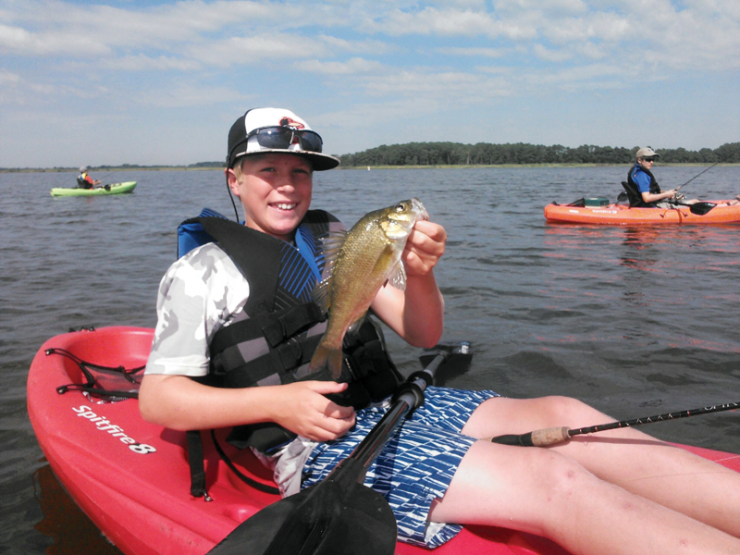Whether you’re looking to send your youngster to camp a few hours each day or several weeks at a time, there are kids camps around the Bay to fit just about every family’s needs. Waterskiing, wakeboarding, paddleboarding, fishing, ecology discoveries, sailing, windsurfing, kayaking, or canoe trips— there are programs to tempt just about any water-loving kid. Parents, listen up: Now’s the time to put down your deposit and hold a spot for little Johnny. Those who hesitate are lost, and if you put off enrolling until May, your child’s likely to miss out.
1. Need For Speed: Waterskiing and Wakeboarding
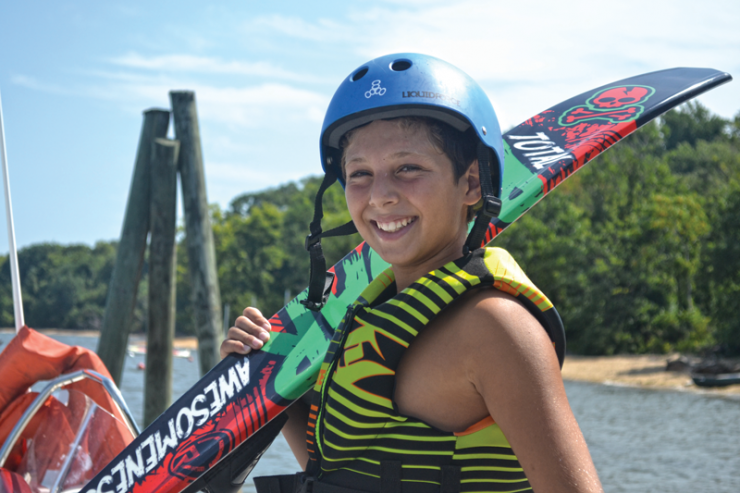
Many local overnight camps offer opportunities to go tubing, but a few camps offer special programs in which kids spend a significant amount of time building waterskiing or wakeboarding skills. YMCA camps Silver Beach and Tockwogh are two examples. Camp Silver Beach is located on the southern tip of Virginia’s Eastern Shore. With 1200 feet of Chesapeake Bay beachfront, they offer a special ski school in addition to traditional camp activities. Ski school campers get six hours of one-on-one instruction in waterskiing, knee-boarding, and wake-boarding by YMCA and U.S. Coast Guard certified counselors. “No prior skiing or wakeboarding experience is needed, and we accept campers ages eight to 16,” says senior damp director Michael Landry.
“For a very young child’s first camp experience, regular camp without the ski school add-on may be a good option, but it depends on the specific situation. Ski school can be appropriate even for a young child if he or she has already been to camp or for a first-time camper who’s grown up skiing.” Landry continues, “At the beginning of last year we restructured our ski program. Our new model gives us more flexibility with the weather; the kids get a three-to-two camper to instructor ratio on the boats, and we’ve seen more growth in their skiing and wakeboarding skills. So it’s been a very successful change that we’ll continue this year.”
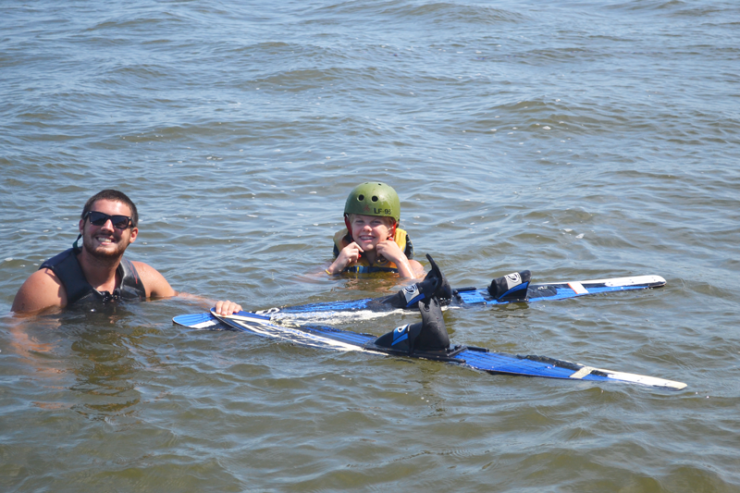
“Kids who are enrolled in ski school spend half the day on land participating in activities such as archery, drama, environmental discoveries, and our alpine adventure course. And kids who aren’t enrolled in ski school still get plenty of opportunities to be on the water,” says Landry. “We have a brand new fleet of stand up paddleboards, three pools, sailboats, fishing, and banana boat rides.” ymcashr.org/camp-silver-beach
Further north on the Eastern Shore in Maryland sits another waterfront YMCA camp, Camp Tockwogh, which offers a special wakeboard and waterski program for kids who’ve completed grades seven to 10. Executive director Elizabeth King says, “In our specialty ski camp the kids are on the water all day, and in the evening they participate in all the traditional camp activities. They don’t need any prior experience, just enthusiasm and a willingness to learn.” But you don’t have to be in Tockwogh’s ski camp to get out skiing or wakeboarding. “Campers in our traditional program, kids who’ve completed grades 2 to 9, also have the opportunity to waterski each day if they choose.” Camp Tockwogh instructors on the boats are certified lifeguards for safety and USA Water Ski Level I for coaching. And King adds, “We have the best staff. Safety is paramount, and I only hire people I’d trust with my own children.” ymcacamptockwogh.org
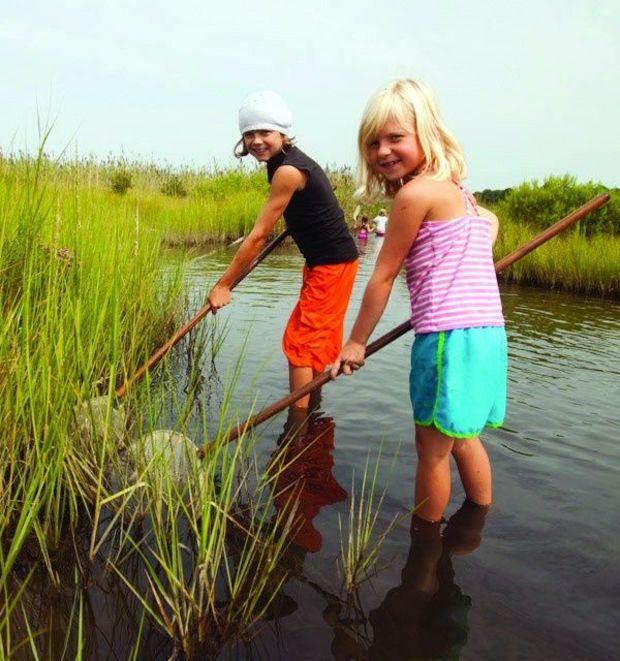
2. Ecology and Nature Programs
The Chesapeake Bay Environmental Center (CBEC) in Grasonville, MD, offers a variety of camps for a variety of age groups throughout the summer. Parents can choose from a list of five-day nature programs, with ages ranging from kindergarten to grade eight, and topics such as Bay history, survival techniques, outdoor sports/team-building, and Life Around the Bay, which features marsh mucking and kayaking. CBEC is all about a “hands-on, feet-wet” approach, and that is why the kids love it. Katey Nelson is the Education Manager at CBEC and tells us that being a camp director was a natural choice for her. Nelson says, “I always wanted a job where I got to play outside with kids every day. What’s even better is that I can teach the campers through play and I can learn from them as well.” bayrestoration.org
What’s something creative you do to get kids excited? We start every morning with camp songs, a stretch, and “getting to know you” games. This not only gets the kids excited for the day, but gets them up and active, laughing, and meeting new friends.
What is your background and the background of some of your other instructors? I have a masters in teaching with a focus on environmental studies and have been working at summer camps and nature centers for the past 15 years. Our counselors are generally college and high school students interested in environmental science and education, with great enthusiasm for the outdoors and sharing their knowledge with younger students. They are wonderful role models and develop close relationships with the campers.
What do you do to emphasize safety? The counselors are all CPR and First Aid trained, as well as trained in our emergency procedures. We have ample adult supervision, and since the campers work closely with their counselors, they feel comfortable bringing any concerns and anxiety to our attention.
What is your favorite activity at camp? One of my favorite activities is Catch a Bay Critter, where the kids get hands-on and feet-wet to explore the diversity of critters in the marsh, which is also a great way to cool down in the summer (shown in photo).
3. Paddlesports: Canoe, Kayak, SUP
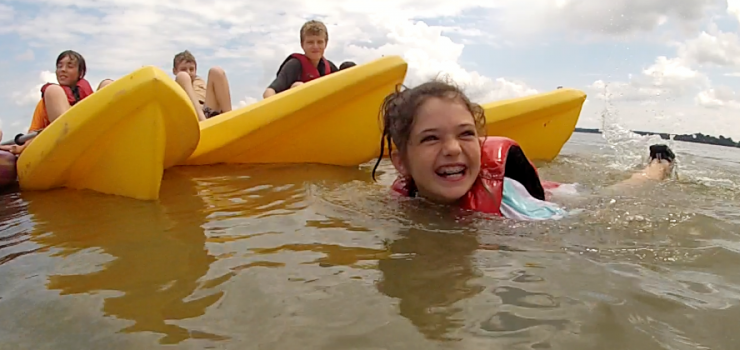
Ultimate Watersports in Baltimore County offers Extreme Camp for ages nine to 12 and Extreme Camp II for ages 12 to 16. And while the older group also learns how to sail and windsurf, the younger group is all about paddling. In this week-long day camp, campers go on kayak tours of the marsh, learn how to paddle stand up paddleboards, explore the nearby Marshy Point Nature Center, and even get to paddle giant monster SUPs capable of holding up to eight campers each, making them great for team-building. Operations manager and camp counselor Mike Davis can’t imagine spending his summers doing anything else. ultimatewatersports.com
What’s something creative you do to get kids excited? Name games: it’s always fun to break the ice with kids and get them out of their shells. Whether it’s just about learning each other’s names or learning a fun fact about the kids, everyone has more fun once they get past their shyness.
What are some of your priorities both on and off the water? Safety always has to be priority number one. Priority number two is fun. Priority off the water is keeping the excitement going.
What do you enjoy most about teaching? The best part about my job is watching these kids have such a great experience. To me that’s what it’s all about. It’s about making memories that you can always look back fondly on, and being a part of that is amazing!
4. Fish On!
Since 2009, Capt. Chris Dollar has directed his “Think Like a Fish!” summer camps that teach lifelong outdoor skills in a fun and safe way. Capt. Dollar’s camps teach kids how to fish (or improve fishing skills), tie fishing knots, handle gear and tools, and more. Kids explore marshes, creeks, and oyster reefs while fishing both on shore and in kayaks. Capt. Dollar answered a few of our questions. cdollaroutdoors.com
What are some of your priorities both on and off the water? The main priority for anyone who works with kids—especially on and around the water and animals and gear—should be to do everything possible to create a safe environment. This means clearly explaining activities, showing kids how to properly use the gear, and keeping an eye out for any dangers. This also means talking to parents (and campers) so they’re clear on expectations, and so they know they also have responsibilities. That’s followed very closely by making their time with us as fun as possible.
What do you do to keep it fun? Running a fishing camp is like running sports practice. Enthusiasm is a key, and that depends on the variety of activities and the interest level of campers. If I sense enthusiasm is starting to wane, and a glaze begins to cover their eyes, I change things up. For example, we use all kinds of nets to catch bait fish, crabs, and shrimp. Friendly competition is a good thing, so we sometimes make a game out of catching critters. Also, games in between scheduled activities are great to re-energize campers. And water and snack breaks are crucial. I abide by the axiom “never fall in love with your first plan;” so I always have a backup plan or two.
What do you do to emphasize safety? We model the behavior we expect. Everyone wears a lifejacket—it’s non-negotiable. I start with calm repetition of the “rules,” but if it’s a rowdy bunch, and that’s not working, we call a timeout to review. It is critical to anticipate and correct situations that can turn from careless to potential injury. Horseplay is a prime example.
What is the most rewarding thing about teaching for you? Watching the excitement in a kid who’s never caught a fish or crab, or a camper who has never paddled a kayak gain the confidence to be comfortable on the water.
5. Gybe, ho! Sailing Camps
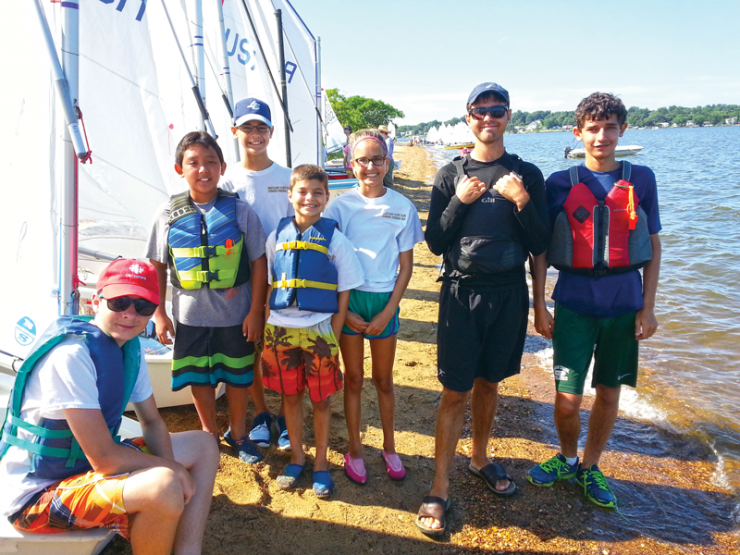
The Maryland Yacht Club in Pasadena, MD, is one of many clubs around the Bay that offers a sailing program to its members as well as the public. They have a range of classes from beginning sailing to regatta racing during an eight-week summer session for children ages eight to 16. MYC’s Carl Treff answered a few of our questions. mdyc.org
What are your instructor’s sailing backgrounds? We hire a certified U.S. Sailing instructor, supplemented with numerous volunteers. Our lead instructor will typically have dinghy regatta racing experience to help with the logistics of attending local regattas. Our hired assistant instructor races on his high school sailing team. The numerous volunteers who help throughout the weeks have decades of sailing experience, including big boat racing and extensive cruising.
What do you do to get kids excited? We use multiple “craft like” experiences during the sessions, including building and decorating model sailboats and racing them in the pool, creating their own personal burgee (which then flies from their dinghy), and a swimming session every day at lunch. We also have on-water games using water guns, a tennis ball challenge, and a poker run.
How about safety? We go over rules of the road, safety on the docks, and general boating safety.
What Should Parents Look For in a Camp?
- Safety
- Caring Counselors
- Well-Organized Program
- Leadership Opportunities
- Well-Trained Counselors
- Happy, Smiling Campers
- Wide Range of Activities
- Cost
- Transportation
- Accreditation
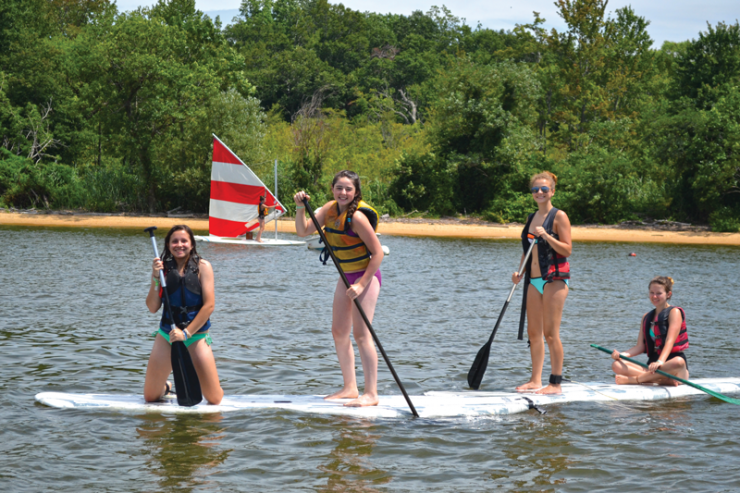
What Do Kids Get From Camp?
- Independence
- Problem Solving Skills
- New Friends
- New Creative or Athletic Skills
- Fun Times
- Physical Activity
- Creative Expression
- Group Skills
- Relaxation
- Responsibility
